New Faculty 2011-2012
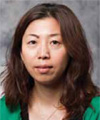
Yan Bai
Assistant Professor of Economics
Yan Bai is an assistant professor of economics at the University of Rochester. Yan completed her PhD in economics from the University of Minnesota, having completed her bachelor’s and master’s degrees in China. Prior to coming to Rochester, Yan was a visiting scholar at Princeton University and an assistant professor at Arizona State University. Yan’s research focuses on international macroeconomics, and she has written a number of papers on the role that barriers to financial investment have on international capital flows and business cycles. Her most recent work examines the role of uncertainty in why employment drops so much during economic downturns—a key puzzle for the great recession and the disappointing recent recovery.
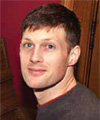
Corbett Bazler
Assistant Professor of Music
Corbett Bazler specializes in Italian Baroque opera, particularly the operas of Handel and his London contemporaries. His dissertation, titled “The Comedies of Opera Seria: Handel’s Post-Academy Operas, 1738–1743,” explores the relationship between Handel’s late operas, comic spoken theater, and other forms of British entertainment in mid-18th-century London. Other research interests include late 19th- and early 20th-century opera and issues surrounding operatic production and performance today.

Joel Burges
Assistant Professor of English
Joel Burges joins the faculty of English and film and media studies following a Mellon Postdoctoral Fellowship in Literature and Comparative Media Studies at the Massachusetts Institute of Technology. Burges received his PhD from Stanford University in English and American Literature, and his BA from Yale University in American Studies. He is currently working on two book projects, a manuscript entitled Turning Back the Clock: Technological Obsolescence and Historical Time in Contemporary Culture and, as coeditor with Amy J. Elias, a collection entitled Contemporalities: Keywords for the Present. Working at the intersection of cultural studies, critical theory, and media studies in these projects, Burges is rethinking ideas about time and history that have dominated thought for the past 30 years; he is specifically interested in how that which we have rejected as obsolete, outdated, and old-fashioned figures centrally in the works of post-1980 novelists and filmmakers as a repository for alternative modernities and alternative temporalities, such that the past supersedes the future as the temporal horizon of art and politics alike in their work. Burges also periodically contributes short “blog-essays” to Arcade: A Digital Salon, and he is preparing forthcoming essays about description, time, and the poetics of world-building in contemporary television that may form the foundation of a later book provisionally entitled Fiction after TV. As both a scholar and teacher committed to the future of the humanities, Burges is extremely excited to be joining the University of Rochester.
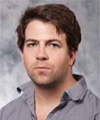
Michael Caie
Assistant Professor of Philosophy
Michael Caie is an assistant professor of philosophy. He completed an undergraduate degree in philosophy at McGill University and did his graduate work at the University of California, Berkeley. Michael’s work focuses on questions in philosophy of language, philosophical logic, and epistemology. He is interested in the nature of linguistic representation and the norms governing the mental states of rational agents. He has written papers on the topic of vagueness in language and how this phenomenon should be accommodated in a theory of meaning. In his dissertation he explores how certain paradoxes, well known in philosophical logic, can be shown to have consequences for our understanding of rational norms and the mental states of rational agents. He has teaching interests in philosophy of language, epistemology, metaphysics, and logic.
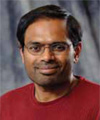
Srihari Govindan
Professor of Economics
Srihari Govindan is professor of economics at the University of Rochester. Hari joins the department in Rochester after having served as professor of economics at the University of Iowa, where he was also the director of graduate studies. Govindan has previously held appointments at the University of Western Ontario and Northwestern University. He holds the PhD in economics from State University of New York at Stony Brook. Hari is a leader in the fields of game theory and mathematical economics, with his work establishing a basis for research in game theory. Hari is currently working on auction theory, connecting that field to innovations in game theory.
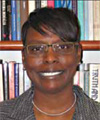
Margarita Guillory
Assistant Professor of Religion
Margarita Guillory earned her BA in chemistry from Emory University. She became an award-winning high school science teacher prior to developing an interest in the academic study of religion. She earned an MTS from the University of St. Thomas (Houston) and then entered the PhD program at Rice University. At Rice, she specialized in American religious history and wrote a dissertation on the African-American spiritualist churches of New Orleans, under the direction of Anthony Pinn. Margarita brings a socialscientific approach to the study of religion, using the methods of sociology of religion, psychology of religion, and ritual studies to explore the meaning of ritual for African Americans. While working on turning her dissertation into a book, Margarita has already begun a new research project on African-American spiritualists in Upstate New York.

Benjamin Hayden
Assistant Professor of Brain and Cognitive Sciences
Benjamin Hayden is a neuroscientist who studies brain mechanisms of economic choice and self-control. He also studies diseases that hijack these brain systems, especially addiction and obsessive-compulsive disorder. He is particularly interested in how high-level processing centers in the brain, such as prefrontal and cingulate cortex, contribute to making decisions under a variety of conditions. To tackle these problems, Hayden’s research combines traditional approaches rooted in psychology and neurobiology with ideas from control theory, learning theory, economics, and foraging theory. He obtained his PhD from the University of California Berkeley where he studied the role of visual cortex in high-level cognitive processes, and was a postdoctoral fellow at Duke University where he studied the neural basis of decision making under uncertainty.
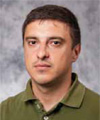
Asen Kochov
Assistant Professor of Economics
Asen Kochov is an assistant professor of economics at the University of Rochester. Asen completed his PhD in economics at the University of Rochester, and has been a visiting scholar at Boston University and an assistant professor at Bonn University. Asen’s research interests are in the fields of economic theory with a particular focus on decision theory. His current research addresses the problem of modeling unforeseen contingencies, a problem that has not been adequately analyzed in the profession. Asen’s approach has provided important insights into this difficult problem. Asen will be teaching both undergraduate and graduate courses at Rochester. To relax, Asen enjoys a good game of chess or a rigorous table tennis game.
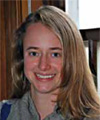
Jennifer W. Kyker
Assistant Professor of Music
Jennifer Kyker earned her PhD from the University of Pennsylvania. Her research has explored issues of audience reception in postcolonial Zimbabwean popular music. She has studied the mbira dzavadzimu, an instrument played at various ritual events within Zimbabwe. Other research interests include how women navigate expectations of gender in mbira performance, and the evolution of neotraditional musical styles, such as the contemporary Zimbabwean marimba.
As an undergraduate, Kyker received a Fulbright Fellowship to conduct research on musical performance at the kurova guva ceremony. Subsequently she became deeply involved in HIV/AIDS research, activism, and upon returning to the United States, founded the nonprofit organization Tariro, working to educate and empower teenage girls in Zimbabwean communities affected by HIV/AIDS (www.tariro.org). In recognition of her work on HIV/AIDS, she has been honored with several fellowships and awards, including a Leboy-Davies Fellowship in Women’s Studies from the University of Pennsylvania, and an alumnae fellowship from Mount Holyoke College.
Working with musicians from Zimbabwe, Professor Kyker has produced several albums featuring music in a variety of genres. Her interviews with Zimbabwean artists have additionally received national exposure through their inclusion on the radio program Afropop Worldwide.
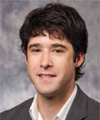
Brad Mahon
Assistant Professor of Brain and Cognitive Sciences and of Neurosurgery
Brad Mahon is a cognitive neuroscientist who studies how concepts of common objects are organized and represented in the brain. His research uses functional MRI and behavioral analysis to study disruption and recovery of neural systems after brain damage. The types of brain-damaged patients studied in his research include patients with brain tumors and stroke patients. The particular focus of his research is on how concepts are retrieved from vision and how concepts are mapped onto language. Brad Mahon received his PhD from Harvard University (2009) where he studied the organization of knowledge in the brains of congenitally blind adults.
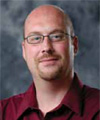
Michael Neidig
Assistant Professor of Chemistry
Michael Neidig received his BA in chemistry from Colgate University in 1999. Following studies at the University of Cambridge as a Churchill Scholar, leading to an MPhil degree in chemistry, he moved to Stanford University where he received his PhD in chemistry in 2007. At Stanford, Michael became interested in the use of physical-inorganic spectroscopic methods to understand transition metal catalytic systems in biological systems. Desiring to study applied transition metal catalysis, he moved to Dow Chemical after receiving his PhD and focused on catalyst development research for large scale, practical implementation of both homogeneous and heterogeneous catalysis. Motivated to return to a more independent research career in academics, he moved to Los Alamos National Laboratory as a director’s postdoctoral fellow. In 2009, Michael joined the Department of Chemistry at the University of Rochester as an assistant professor. His research at Rochester focuses on the generation of new fundamental insight into structure, bonding, and mechanism in homogeneous, heterogeneous, and biological nonprecious metal catalysts.

Cary Peppermint
Assistant Professor of Studio Arts
Cary Peppermint is an assistant professor of art. He is a practicing artist whose studio production explores the convergence of ecological, cultural, and digital networks. His postdisciplinary practice maintains strong ties to Internet and performance art. Since co-founding ecoarttech.com with Leila Nadir in 2005, Cary’s art has turned toward the imagination of the environment as a convergent network of biological, cultural, and digital spaces. His works are in the permanent collections of the Walker Art Center, Rhizome.org at the New Museum for Contemporary Art, Computer Fine Arts, and the Whitney Museum of American Art. Cary’s curatorial work has focused on digital, back-country, off-the-grid exhibitions such as Wild Info Net, a solar-powered sound-art installation in the Catskill Mountains, and Nature 2.0, one of the first exhibitions of eco-art engaging new media technologies. Peppermint has held previous appointments at Cornell University, Colgate University, and the Pratt Institute.
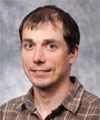
Vasilii Petrenko
Assistant Professor of Earth and Environmental Sciences
Vasilii Petrenko received his BA in chemistry from UNH in 1997. He then became an educator, teaching middle school and high school science, first at the International School of Dusseldorf and later, at the Rivers School near Boston. Vasilii received a master’s degree in education from Harvard University in 2000. While at Harvard, he took some courses in earth science that sparked his interest in this field in general, and in the area of past climate change in particular. Vasilii went on to get his PhD in earth sciences (2008) at Scripps Institution of Oceanography (part of UC, San Diego). Vasilii’s research at Scripps focused on making the first measurements of carbon-14 in past atmospheric methane recovered from ice cores in order to understand how natural wetlands and marine methane hydrates respond to climate warming events. After leaving Scripps, Vasilii continued his ice core research at the Institute of Arctic and Alpine Research (part of the University of Colorado, Boulder).
Vasilii uses ancient ice and air preserved in the polar ice caps to study past atmospheric composition, chemistry, and climate. One ongoing direction of research is understanding past natural variations in methane (an important greenhouse gas), particularly in response to climate change. Another research direction explores past changes in atmospheric carbon monoxide and links to the oxidizing capacity of the atmosphere. Vasilii is also interested in using carbon-14 produced in polar ice by cosmic rays to understand past changes in the cosmic ray flux.
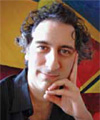
Ezra Tawil
Associate Professor of English
Ezra Tawil received his PhD from Brown University. His research has focused on American literature in English between the middle of the 18th century and the middle of the 19th century. His work is shaped by the objectives of “literary history” in the strong sense of that term: at once the history of literary forms and an accounting of the contribution those forms made to broader historical processes. The point is not to blend literary questions and historical ones indiscriminately, but in fact to register what is particular about literary writing—the specific kinds of pleasure it offers, and the specific kinds of cultural power that distinguish it from other forms of discourse. His first book, The Making of Racial Sentiment: Slavery and the Birth of the Frontier Romance (Cambridge, 2006), showed how the period between 1750 and 1850 oversaw a decisive shift in the cultural understanding of racial difference, and argued that a particular literary genre played an important and unacknowledged role there. In a similar spirit, but with a different emphasis, his current book project takes up the origins of a specifically literary version of American exceptionalism at the end of the 18th century, during the period of transition from British- American colonies to the U.S. nation. It was an idea that would have made little sense earlier in the colonial period, and yet it would be entirely taken for granted a century later. When did it first make sense to speak of an “American literature” as a distinct tradition, and in precisely what terms did the writers themselves do so?
